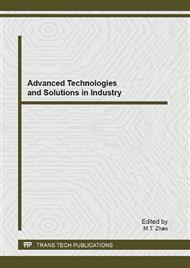p.575
p.579
p.584
p.589
p.593
p.598
p.603
p.608
p.613
An Adaptive Regularized Fast Iterative Shrinkage-Thresholding Algorithm for Image Reconstruction in Compressed Sensing
Abstract:
Aiming at the problems of worse reconstructed image quality and larger time complexity of the fast iterative shrinkage-thresholding algorithm in compressed sensing, this paper presents adaptive regularized fast iterative shrinkage-thresholding algorithm. This algorithm brings in the idea of adaptively selecting regularization parameter on the basis of using gradient method and threshold shrinkage to minimize the objective function. During the iteration process regularization parameter is adaptively selected from the whole value in order to adjust the proportion of the former part and the latter part of the objective function value. Simulation results show that the proposed algorithm, compared with the traditional algorithms, obtains the better reconstructed image quality and lower time complexity.
Info:
Periodical:
Pages:
593-597
DOI:
Citation:
Online since:
June 2013
Authors:
Price:
Сopyright:
© 2013 Trans Tech Publications Ltd. All Rights Reserved
Share:
Citation:


